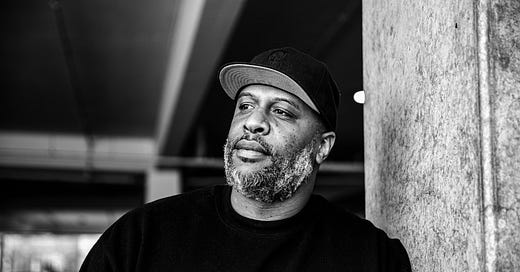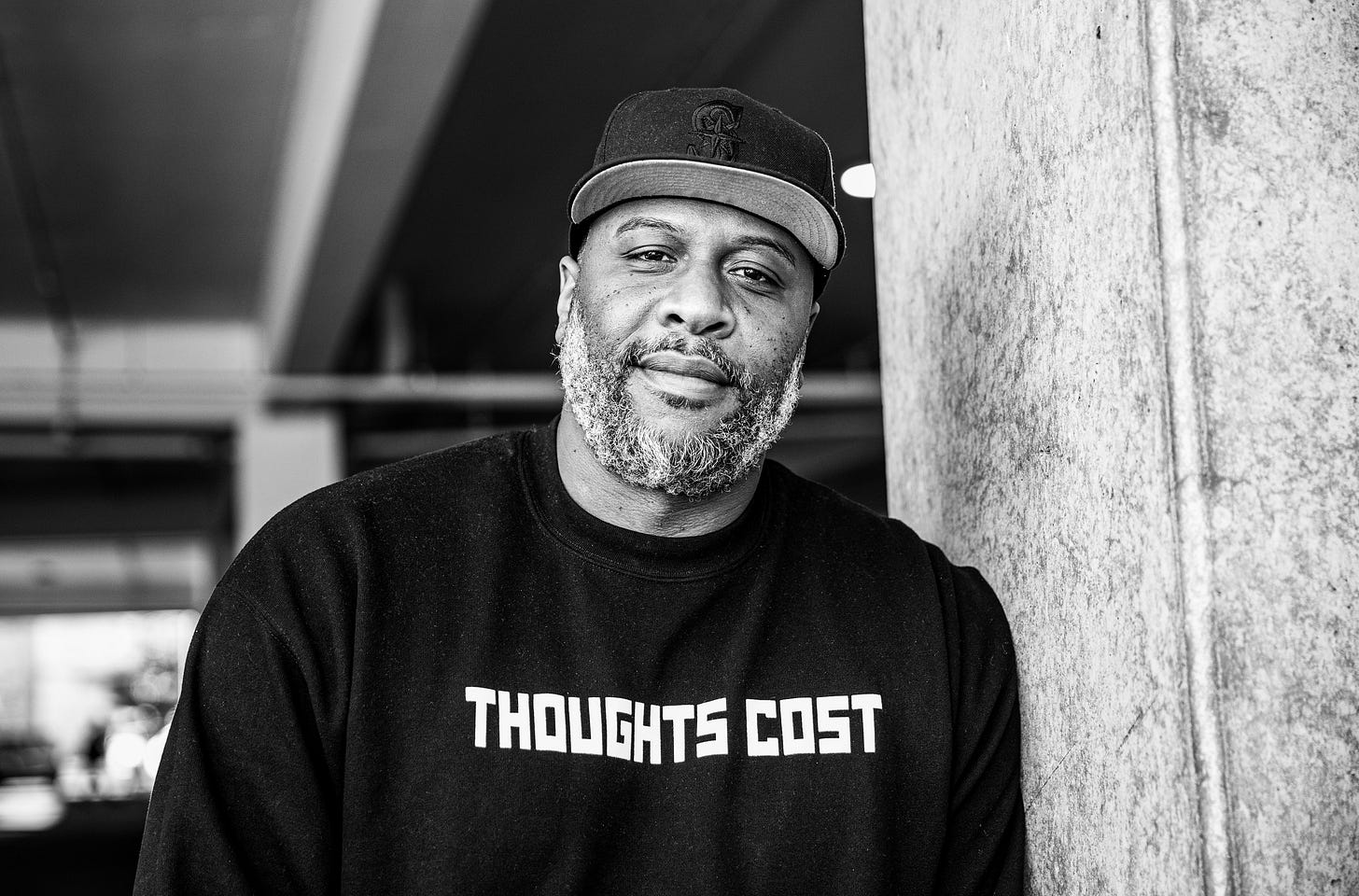Thoughts Cost: How Anthony Washington Turned Passion Into Purpose
A former athlete turned educator, Anthony Washington is revolutionizing student advocacy, proving that knowledge – and action – are invaluable.
SEATTLE – Anthony Washington sat on a stool at a Starbucks inside the QFC at University Village. Behind him, people ordered their lattes and those little round egg bites – think mini hockey pucks with Gruyère and bacon – while a grocery store employee pushed a stack of shopping carts that clattered and clanged across the floor.
Amid this chaos, wearing a black "Thoughts Cost" sweatshirt (the name of his business), the former Garfield High School and University of Washington basketball standout searched for the right words to explain his journey to this moment, at this Starbucks, in this QFC at University Village.
He started with the sweet sound of the bell at Seattle Children’s Hospital – a happy clang he thought marked the end of his daughter, Eniyah’s cancer journey.
Five years after being diagnosed with acute lymphoblastic leukemia, and just two days before her father’s birthday, Eniyah rang the bell signaling the end of her cancer fight.
Even now, as his daughter battles cancer for a second time, Washington's voice carries a slight quiver.
“She beat cancer on my birthday,” he said. “It’s so emotional, and then you have to tell her, ‘Now you’ve got to ring the bell again.’”
Diagnosed just before kindergarten, Eniyah, now 13, had only recently returned to the basketball court after her first fight with cancer when her family realized something was wrong.
“It was her first year doing anything physical,” Washington said. “She had built her body back, right to where she finally felt comfortable.”
Then her knee started swelling. Washington’s first thought was a torn ACL, but the symptoms didn’t align with a typical knee injury.
“It was weird,” he said. “The swelling would go down, but it would come right back. It wasn’t normal.”
Eniyah was eventually diagnosed with B-cell acute lymphoblastic leukemia, requiring a bone marrow transplant. Once again, the family exhaled. She was home, they were celebrating New Year’s Eve, and looking forward to the future.
Within three days, Eniyah’s body was covered in a rash. After the transplant, doctors administered a therapeutic dose of drugs to prevent graft-versus-host disease (GVHD), but they struggled to find the right balance for Eniyah. Now, she is back in the hospital.
On this particular afternoon, Washington was running late because he had to wash a load of laundry his daughter requested. He is grateful for these small errands. He will gladly make as many hospital trips as needed, because his daughter is still alive.
He has walked the hallways of Seattle Children’s. He has seen the empty beds. The grieving parents.
“I’ve seen parents yelling at the doctor, and you realize … the bed is empty. There’s no kid,” he said. “It’s scary. Just … the worst thing that could happen to you, to your family.”
“I’ve seen parents yelling at the doctor, and you realize … the bed is empty. There’s no kid. It’s scary. Just … the worst thing that could happen to you, to your family.” - Anthony Washington.
Despite everything, Eniyah’s prognosis is positive.
“We’re technically in a good place, but it doesn’t feel like that because the last time we thought we were, we ended up having to come back,” Washington said.
While this is the most important chapter of Washington’s story right now, it is one of many. His journey, from basketball player to teacher to business owner, has been shaped by trials, but he remains focused on advocating for students who cannot advocate for themselves.
Twists and Turns
Before he became a basketball standout, Anthony Washington played the flute and the trombone. Neither instrument was considered cool.
“You had the neighborhood fellas at the store who could see you,” he said. “I didn’t want to go down there.”
Then he grew eight inches in less than two years. At 6-foot-9, he became a basketball player, and he embraced it. His mother, Carol Washington, always saw him as more than just an athlete. She was right. Still, basketball, he said, “gave me access to information I couldn’t get anywhere else.”
As a freshman with the Huskies, he started 12 games before suffering a foot injury that was, ultimately, the first step toward the end of his career at Washington. Then-coach Lorenzo Romar had clear expectations and held his players accountable, which led Washington to transfer to Portland State.
“I can’t be mad at that,” he said. “I have nothing but respect for Coach.”
At Portland State, he played for Ken Bone, who had previously been an assistant coach with the Huskies during Washington’s time there.
He doesn’t see either coach often, but when he does, “it feels good to be able to say, ‘I’m working with kids and holding them to an expectation that some people don’t see for them.’”
Even while pursuing basketball, Washington always thought he would eventually become a history teacher. There were historians in his family. He loved history. It just made sense.
Before he got there, he planned to play professional basketball until he was 35 or 36. His body had other plans. Injuries cut his career short.
“I just kind of started thinking I was a ballplayer,” he said. “But slowly, as I kept getting hurt, every time I came home, I would think, ‘I’m supposed to teach. I want to tell kids they’re more than just football players, more than basketball players.’”
There was one more detour before teaching. When his playing days ended, he got a job at the Hard Rock Café, starting by chopping lettuce and working his way up to kitchen manager.
One day, while riding the bus to work, he looked down at his Jordans, smelled the garlic on his clothes, and thought, What am I doing?
So, he went back to school. He got his scholarship reinstated, finished his bachelor’s degree, making the dean’s list, and then earned a master’s degree. He became a special education teacher.
Along the way, he noticed students being left behind, kids receiving more babysitting than education. Washington isn’t the kind of person who sees injustice and stays silent.
He became an advocate. He showed that students in special education programs could achieve at the same level as their peers – if given the right support.
“Our kids were getting locked up. Just a bunch of stuff was happening,” Washington said. “So I made my class a little more difficult to prove that these kids, who were here for behavior, could actually do the work in their regular classes.”
“Our kids were getting locked up. Just a bunch of stuff was happening. So I made my class a little more difficult to prove that these kids, who were here for behavior, could actually do the work in their regular classes.” - Anthony Washington
When the pandemic hit, Washington was teaching at Garfield, his alma mater.
“I was really pissed off with how my students were being treated,” he said. “I was hearing things in the back room like, ‘They don’t care about math right now.’”
He understood what his students were dealing with and was willing to adapt. He worked to make Zoom-based learning both engaging and effective.
“We were trying to go about school the same way,” he said. “And I just kept pushing back. Then they took my students away, and it hurt my heart. It really hurt my heart. And then … I didn’t have a job.”
Heartbroken, frustrated, and navigating a pandemic, Washington spent a lot of time in his garage, plotting his next move.
Thoughts Cost
As he figured out his future, Washington helped parents advocate for their children. He assisted a friend in securing $1 million in funding for their organization. He did all of this for free.
One day, while discussing this with his fiancee, Hellen Tesfaldet, she pointed out that he was pouring his energy into helping others without getting paid.
She said: "Thoughts cost."
And just like that, he had a business. He realized his ideas had tangible financial value.
Washington admits he knew nothing about running a business. He started with a LegalZoom account and one student.
“I offered direct support for him and also helped his mom navigate the IEP (Individualized Education Program) and special education system.”
That led to work at the district level, refining language around inclusion goals and special education policies.
“At that point, I realized this could be something really big,” said Washington, whose business celebrated its four-year anniversary in December.
Over time, Washington built his business, securing contracts, consulting with students, teachers, schools, and districts. He developed curriculum programs and an adult peer mentoring initiative.
Now, he’s building an AI assistant to help parents and educators navigate the IEP process – along with another AI tool to support struggling readers. He’s creating training programs. He’s doing everything he can to ensure students receive the resources they need to successfully transition from middle school to high school and beyond.
Washington’s journey has taken unexpected turns. But through every challenge, he’s found ways to help others – and he’s just getting started.
If you want to support Washington’s work, click this link to visit his website.
Now that his business is growing, Washington is considering adding another title to his resume – coach.
Father (his son, Anthony Washington Jr., is currently a standout at Roosevelt High School), educator, businessman, advocate, coach, professional athlete.
These are all roles that have shaped the man he is today – the kind of dad who can go from doing laundry for his daughter to sitting down for an interview, then moving on to improve the education system, one initiative at a time.
Washington always thought he would become a history teacher. He’s become so much more.
If you have a story idea, please send me a message.






Proud of my nephew!!
Amazing story, Mason.
Anthony, much respect and admiration to you for your work as an educator, and much love to you and your daughter as she fights her cancer.